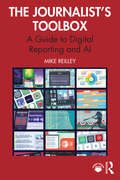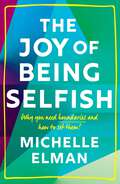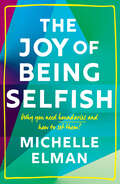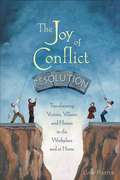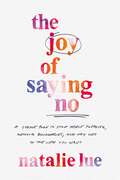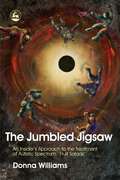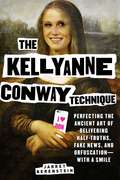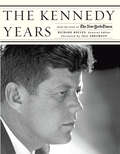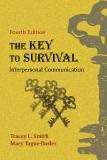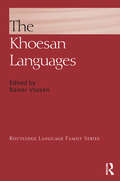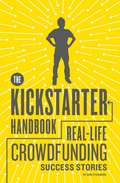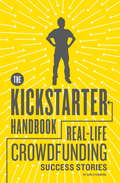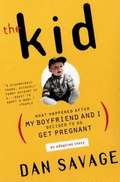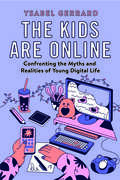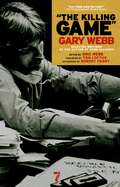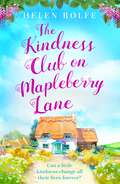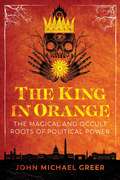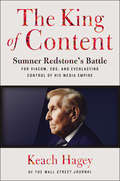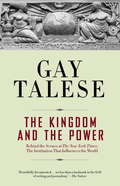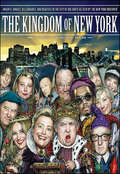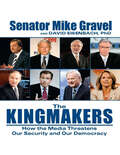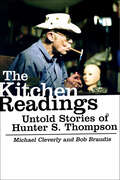- Table View
- List View
The Journalist’s Toolbox: A Guide to Digital Reporting and AI
by Mike ReilleyFocusing on the "how" and "why" of digital reporting, this interactive textbook equips readers with all the skills they need to succeed in today’s multimedia reporting landscape. The Journalist’s Toolbox is an extension of the JournalistsToolbox.ai website, which provides links to tools, organized by beats and topics, as well as social channels, a newsletter, and more than 95 training videos relevant to journalists. This handbook offers a deep dive into these digital resources, explaining how they can be manipulated to build multimedia stories online and in broadcast. It covers all the basics of data journalism, fact-checking, using social media, editing and ethics, as well as video, photo, and audio production and storytelling. The book considers digital journalism from a global perspective, including examples and interviews with journalists from around the world. Packed full of hands-on exercises and insider tips, The Journalist’s Toolbox is an essential companion for students of online/digital journalism, multimedia storytelling and advanced reporting. This book will also make an ideal reference for practicing journalists looking to hone their craft. This book is supported by training videos, interactive charts and a pop-up glossary of key terms which are available as part of an interactive e-book+ or online for those using the print book.
The Joy of Being Selfish: Why You Need Boundaries and How to Set Them
by Michelle Elman'A practical guide that will reclaim your time, energy and self-belief' - Stylist• Do you frequently say 'yes' to people and events to keep those around you happy?• Do you often find yourself emotionally exhausted and physically drained?• Do people describe you as a pushover or 'too nice'?It's time to discover the joy of being selfish and reclaim your life through the art of boundaries!Life coach and influencer @scarrednotscared Michelle Elman is here to teach you the practical side of self-love. Creating and upholding strong boundaries will teach others how to treat you, rid your life of drama and toxic relationships and allow you to love yourself and others in the best way you can.
The Joy of Being Selfish: Why You Need Boundaries and How to Set Them
by Michelle Elman'A practical guide that will reclaim your time, energy and self-belief' —Stylist '[A] smart guide to setting boundaries…While the wise counsel will be tough love for some, those willing to put in the work will get much out of this.'—Publishers Weekly Do you frequently say 'yes' to people and events to keep those around you happy? Do you often find yourself emotionally exhausted and physically drained? Do people describe you as a pushover or 'too nice'? It's time to discover the joy of being selfish and reclaim your life through the art of boundaries! Life coach and influencer @scarrednotscared Michelle Elman is here to teach you the practical side of self-love. Creating and upholding strong boundaries will teach others how to treat you, rid your life of drama and toxic relationships and allow you to love yourself and others in the best way you can.
The Joy of Being Selfish: Why You Need Boundaries and How to Set Them
by Michelle Elman'A practical guide that will reclaim your time, energy and self-belief' —Stylist '[A] smart guide to setting boundaries…While the wise counsel will be tough love for some, those willing to put in the work will get much out of this.'—Publishers Weekly Do you frequently say 'yes' to people and events to keep those around you happy? Do you often find yourself emotionally exhausted and physically drained? Do people describe you as a pushover or 'too nice'? It's time to discover the joy of being selfish and reclaim your life through the art of boundaries! Life coach and influencer @scarrednotscared Michelle Elman is here to teach you the practical side of self-love. Creating and upholding strong boundaries will teach others how to treat you, rid your life of drama and toxic relationships and allow you to love yourself and others in the best way you can.
The Joy of Conflict Resolution
by Gary HarperThe rapid rate of change in the workplace and among families often leads to conflict and confrontation which can undermine productivity and poison relationships. The Joy of Conflict Resolution helps readers understand conflict and why it arises through the lens of the "drama triangle" of victims, villains and heroes. In an accessible, engaging and lighthearted style that uses stories and humor to explore potentially emotionally charged situations, it provides proven and practical skills to move beyond confrontation to resolve conflicts collaboratively. In over 13 years as a trainer, facilitator and mediator, Gary Harper has taught thousands of people in both the public and private sectors to successfully manage conflict. He also teaches for the Centre for Conflict Resolution at the Justice Institute in Vancouver, BC.
The Joy of Saying No: A Simple Plan to Stop People Pleasing, Reclaim Boundaries, and Say Yes to the Life You Want
by Natalie LueAre you still playing a role you learned in childhood to please others, such as the Good Girl/Boy, the Overachiever, or the Helper? Though these kinds of roles may have gained us attention and affection, they prohibited us from becoming our true selves.People-pleasing--putting others ahead of ourselves to avoid something negative or to get something we want or need--runs rampant in our society. Saying yes when we should say no leaves us stuck in frustrating patterns. And when we don&’t say yes authentically, we say it resentfully, which leads to more problems than if we'd said no in the first place.The Joy of Saying No will help you identify your people-pleasing style and habits. A six-step framework then teaches you how to discover the healing and transformative power of no toestablish healthier boundaries,foster more intimate relationships and fulfilling experiences, andreconnect with your values and authentic self.
The Jumbled Jigsaw: An Insider's Approach to the Treatment of Autistic Spectrum `Fruit Salads'
by Donna WilliamsThe Jumbled Jigsaw exposes autism spectrum disorders (ASDs) not as single entities but as a combination of a whole range of often untreated, sometimes easily treatable, underlying conditions. Exploring everything from mood, anxiety, obsessive-compulsive and tic disorders to information processing and sensory perceptual difficulties, including dependency issues, identity problems and much more, Donna demonstrates how a number of such conditions can combine to form a 'cluster condition' and underpin the label 'autism spectrum disorder'. Donna Williams encourages and empowers families to look at what they can do to change their child's environment to address anxiety, overload and other issues. She also gives carers the necessary information to navigate the booming autism marketplace and demand the right tools for the job. The author also challenges professionals to adopt a multi-disciplinary approach to identifying and treating the cluster conditions that make up an autism spectrum diagnosis, and to improve service delivery to those in need. The Jumbled Jigsaw is a call to modern society to take responsibility and accept diversity. It is written in a very human and user-friendly way for parents and for Auties and Aspies themselves, but it is also aimed at carers, professionals, policy-makers and service providers.
The Kellyanne Conway Technique: Perfecting the Ancient Art of Delivering Half-Truths, Fake News, and Obfuscation—With a Smile
by Jarret BerensteinThe only thing Americans want to read more than Trump's tax returns.Constantly late to work? Caught cheating on your spouse again? Can't stop tweeting unhinged rants against your political enemies at three in the morning? Then The Kellyanne Conway Technique is the book you need.Preeminent spin expert and University of Phoenix Online alumnus, Jarret Berenstein, brings you the world's only comprehensive analysis of the tricks, distractions, and outright lies utilized daily by White House advisor Kellyanne Conway and distills her special brand of verbal jujitsu into a spin Bible for the common man.Filled with real transcripts from the esteemed spin-ster herself, The Kellyanne Conway Technique takes the invaluable lessons from her verbal boxing matches with the mainstream media and breaks down, step by step, the mental and rhetorical aerobatics she performs as the talking piece for a president who once wrestled Vince McMahon on the WWE. From alternative facts to the Bowling Green Massacre, take lessons from Kellyanne's greatest hits.The Kellyanne Conway Technique is the perfect guide to outsmarting the Jake Tappers in your own life: whether that is your boss, your husband, or a special hearing of the congressional oversight committee. Never again be held accountable for anything you do with a little help from Kellyanne!
The Kennedy Years: From the Pages of The New York Times
by Jill Abramson“A deeply illuminating, journalistic romp through Camelot from the eyes and minds of the great New York Times reporters of that era and beyond.” —Douglas Brinkley, #1 New York Times–bestselling authorDecades after the assassination of John F. Kennedy, he still ranks as one of the top five presidents in every major annual survey. To commemorate the man and his time in office, the New York Times has authorized a book, edited by Richard Reeves, based on its unsurpassed coverage of the tumultuous Kennedy era. The Civil Rights Movement, the Bay of Pigs, the Cuban Missile Crisis, Vietnam, the space program, the Berlin Wall—all are covered in articles by the era’s top reporters, among them David Halberstam, Russell Baker, and James Reston. Also included are new essays by leading historians such as Robert Dallek and Terry Golway, and by Times journalists, including Sam Tanenhaus, Scott Shane, Alessandra Stanley, and Roger Cohen. With more than 125 color and black-and-white photos, this is the ultimate volume on one of history’s most fascinating figures.“This book is both fascinating and poignant. It brings us back into the Kennedy years while also allowing us to reflect on what made them so emotional. I found myself totally immersed.” —Walter Isaacson, #1 New York Times–bestselling author“Provides much more than a riveting first draft of history. Here we also witness the birth of modern America.” —Cokie Roberts, former political commentator and #1 New York Times–bestselling author “A terrific introduction to the Kennedy presidency for those who did not live through it, and a startling reminder for those who did of how much happened in those 1,000 days.” —David Nasaw, New York Times–bestselling author
The Key to Survival: Interpersonal Communication, Fourth Edition
by Tracey L. Smith Mary Tague-BuslerThe Key to Survival has established itself as an affordable, straightforward text geared toward students with varying backgrounds. Based on reader feedback, research in communication and other fields, and events in the news, the first ten chapters have been thoroughly revised. An added final chapter addresses the widespread surge in communicating electronically and offers practical guidelines for using this medium.
The Khoesan Languages (Routledge Language Family Series)
by Rainer VossenThe Routledge Language Family series is aimed at undergraduates and postgraduates of linguistics and language, and those with an interest in historical linguistics, linguistic anthropology and language development. According to a widely accepted hypothesis, the Khoesan languages represent the smallest of the four language phyla in Africa, geographically distributed mainly in Botswana and Namibia. Today, only 30 or so Khoesan languages may still exist, with about 300,000 native speakers. In other words, most Khoesan languages were already extinct before a sound scholarly interest in them could begin to develop. Drawing together a distinguished group of international experts, with much of the material taken from data collected by the authors’ own field work, this volume presents descriptive, typological, historical-comparative and sociolinguistic material on Khoesan. The Khoesan Languages contains eight sections: an introduction, an overview of genetic relationships, a typological survey and profile of Khoesan, four chapters covering core linguistic areas of Khoesan phonetics and phonology, tonology, morphology and syntax, and a final chapter tackling major issues in Khoesan sociolinguistics, as well as discussions of language contact. Comprehensive and scholarly, yet also lucid in its coverage of a broad range of languages, dialects and sub-groups, this unprecedented and original work represents the current state of Khoesan linguistics.
The Kickstarter Handbook
by Don SteinbergA business book for 21st-century entrepreneurs, THE KICKSTARTER HANDBOOK will be the first book to market on a phenomenally popular website--and a new way of financing your wildest dreams.
The Kickstarter Handbook: Real-Life Crowdfunding Success Stories
by Don SteinbergSo you want to produce a short film. Or design a new line of jewelry. Or manufacture a revolutionary solar-powered garden sprinkler. There's just one catch: You need $100,000 to bankroll your dream, and your checking account has barely enough to cover the rent. Enter Kickstarter.com--the phenomenal "crowdfunding" website launched in 2009 that brings venture capital to the masses. At Kickstarter, it's not uncommon for entrepreneurs to raise $50,000, $100,000, $250,000, or more. All you need is a great idea--and The Kickstarter Handbook. Business journliast Don Steinberg has interviewed dozens of artists and inventors who launched their passion projects online. Through their voices, you'll explore all the strategies of a successful Kickstarter campaign. You'll learn the elements of a compelling Kickstarter video, innovative ways to market your projects, tips for getting donors onboard, and the secrets of irresistible Kickstarter "rewards." You'll also discover what to do in a best-case scenario--when your project goes viral and the cash starts flowing in. On Kickstarter, it happens to a few lucky visionaries every week. Here's how to be one of them.
The Kid: What Happened After My Boyfriend and I Decided to Go Get Pregnant
by Dan SavageDan Savage's nationally syndicated sex advice column, "Savage Love," enrages and excites more than four million people each week. In The Kid, Savage tells a no-holds-barred, high-energy story of an ordinary American couple who wants to have a baby. Except that in this case the couple happens to be Dan and his boyfriend. That fact, in the face of a society enormously uneasy with gay adoption, makes for an edgy, entertaining, and illuminating read. When Dan and his boyfriend are finally presented with an infant badly in need of parenting, they find themselves caught up in a drama that extends well beyond the confines of their immediate world. A story about confronting homophobia, falling in love, getting older, and getting a little bit smarter, The Kid is a book about the very human desire to have a family.
The Kids Are Online: Confronting the Myths and Realities of Young Digital Life
by Ysabel GerrardA nuanced, intimate picture of how young people live with and on social media. Today's young people find themselves at the center of widespread debates about their online safety, and they are often told that social media platforms affect their mental health and body image by exposing them to cyberbullying and distressing images. Foregrounding their voices and experiences, The Kids Are Online explores how they navigate their identities across platforms and how they really feel about their young digital lives. Ysabel Gerrard talked to more than a hundred teens to unpack the myths and realities of their social media use. Instead of framing today's big platforms as either good or bad, she identifies moments when young people encounter social apps in paradoxical ways—both good and bad at the same time. Using the concepts of stigma, secrecy, safety, and social comparison, she helps readers understand young people's experiences. The Kids Are Online proposes a series of recommendations for parents, families, schools, technology companies, and policymakers to imagine how we might build safer social media systems.
The Killing Game
by Gary WebbGary Webb had an inborn journalistic tendency to track down corruption and expose it. For over thirty-four years, he wrote stories about corruption from county, state, and federal levels. He had an almost magnetic effect to these kinds of stories, and it was almost as if the stories found him. It was his gift, and, ultimately, it was his downfall.He was best known for his story Dark Alliance, written for the San Jose Mercury News in 1996. In it Webb linked the CIA to the crack-cocaine epidemic in Los Angeles during the Iran Contra scandal. His only published book, Dark Alliance is still a classic of contemporary journalism. But his life consisted of much more than this one story, and The Killing Game is a collection of his best investigative stories from his beginning at the Kentucky Post to his end at the Sacramento News & Review. It includes Webb's series at the Kentucky Post on organized crime in the coal industry, at the Cleveland Plain Dealer on Ohio State's negligent medical board, and on the US military's funding of first-person shooter video games. The Killing Game is a dedication to his life's work outside of Dark Alliance, and it's an exhibition of investigative journalism in its truest form.
The Kindness Club on Mapleberry Lane
by Helen Rolfe'A warm, comforting tale of family and community which brims with kindness and love' Annie Lyons'A heartwarming story about family, forgiveness and the importance of kindness... If you're looking for a feelgood novel in these difficult times, this is definitely it!' Fiona HarperThe smallest things can make the biggest difference...Veronica Beecham's cottage is the neatest house on Mapleberry Lane. A place for everything, and everything in its place - that's her motto. But within her wisteria-covered walls, Veronica has a secret: she's hardly left her perfect home in years.Then her teenage granddaughter, Audrey, arrives on the doorstep, and Veronica's orderly life is turned upside down. Shy and lonely, Audrey is struggling to find her place in the world. As a bond begins to form between the two women, Audrey develops a plan to give her gran the courage to reconnect with the community - they'll form a kindness club, with one generous action a day to help someone in the village, and perhaps help each other at the same time. As their small acts of kindness begins to ripple outwards, both Veronica and Audrey find that with each passing day, they feel a little braver. There's just one task left before the end of the year: to make Veronica's own secret wish come true...A heartwarming story with community at its heart, about the little kindnesses that make the world a better place. Perfect for fans of Cathy Bramley and Holly Hepburn!***Readers adore Helen's heartwarming storytelling'Enchanting... Employing all the warmth and charm of Maeve Binchy, and a special brand of kindness that she has made her own, Rolfe weaves together elements of mystery, romance, family relationships and the warmth of community in a story guaranteed to bring laughter, tears and miles of smiles' Lancashire Post'A lovely community, full of friendship and love''I enjoyed every minute of this book and found it very hard to put down''Lovely, feel-good...filled with lots of love''Gave you all the emotions: suspense, happiness and excitement''Helen Rolfe's writing brought a smile to my face''Loved loved loved this fabulous book''Full of wonderful characters, great food, a lovely location'
The Kindness of Strangers
by Kate AdieKate Adie's story is an unusual one. Raised in post-war Sunderland, where life was 'a sunny experience, full of meat-paste sandwiches and Sunday school', she has reported memorably and courageously from many of the world's trouble spots since she joined the BBC in 1969. THE KINDNESS OF STRANGERS encompasses Adie's reporting from, inter alia, Northern Ireland, the Middle East, Tiananmen Square and, of course, the Gulf War of 1991. It offers a compelling combination of vivid frontline reporting and evocative writing and reveals the extraordinarily demanding life of the woman who is always at the heart of the action. Although an intensely private person, Kate Adie also divulges what it's like to be a woman in a man's world - an inspiration to many working women.
The Kindness of Strangers: The Autobiography
by Kate AdieKate Adie's story is an unusual one. Raised in post-war Sunderland, where life was 'a sunny experience, full of meat-paste sandwiches and Sunday school', she has reported memorably and courageously from many of the world's trouble spots since she joined the BBC in 1969. THE KINDNESS OF STRANGERS encompasses Adie's reporting from, inter alia, Northern Ireland, the Middle East, Tiananmen Square and, of course, the Gulf War of 1991. It offers a compelling combination of vivid frontline reporting and evocative writing and reveals the extraordinarily demanding life of the woman who is always at the heart of the action. Although an intensely private person, Kate Adie also divulges what it's like to be a woman in a man's world - an inspiration to many working women.
The King in Orange: The Magical and Occult Roots of Political Power
by John Michael Greer• Details the magical war that took place behind the scenes of the 2016 election • Examines in detail the failed magical actions of Trump&’s opponents, with insights on political magic from Dion Fortune&’s war letters • Reveals the influence of a number of occult forces from Julius Evola to chaos magick to show how the political and magical landscape of American society has permanently changed since the 2016 election Magic and politics seem like unlikely bedfellows, but in e King in Orange, author John Michael Greer goes beyond super cial memes and extreme partisanship to reveal the unmentionable realities that spawned the unexpected presidential victory of an elderly real-estate mogul turned reality-TV star and which continue to drive the deepening divide that is now the de ning characteristic of American society. Greer convincingly shows how two competing schools of magic were led to contend for the presidency in 2016 and details the magical war that took place behind the scenes of the campaign. rough the in uence of a number of occult forces, from Julius Evola to chaos magicians as well as the cult of positive thinking, Greer shows that the main contenders in this magical war were the status quo magical state--as de ned by the late scholar Ioan Couliano--which has repurposed the &“manipulative magic&” techniques of the Renaissance magi into the subliminal techniques of modern advertising, and an older, deeper, and less reasonable form of magic--the &“magic of the excluded&”--which was employed by chaos magicians and alt-right internet wizards, whose desires coalesced in the form of a frog avatar that led the assault against the world we knew. Examining in detail the magical actions of Trump&’s opponents, with insights on political magic from occultist Dion Fortune&’s war letters, the author discusses how the magic of the privileged has functioned to keep the comfortable classes from being able to respond e ectively to the populist challenge and how and why the &“Magic Resistance,&” which tried to turn magic against Trump, has failed. Showing how the political and magical landscape of American society has permanently changed since the 2016 election cycle, Greer reveals that understanding the coming of the King in Orange will be a crucial step in making sense of the world for a long time to come.
The King of Content: Sumner Redstone's Battle for Viacom, CBS, and Everlasting Control of His Media Empire
by Keach Hagey“An epic story . . . filled with legal conflicts, boardroom battles, angry ex-girlfriends, family drama and a ninety-five-year-old media mogul.” —The Washington PostSumner Murray Redstone, who lived by the credo “content is king,” leveraged his father’s chain of drive-in movie theaters into one of the world’s greatest media empires through a series of audacious takeovers designed to ensure his permanent control. Over the course of this meteoric rise, he made his share of enemies and feuded with nearly every member of his family.In The King of Content, Wall Street Journal reporter Keach Hagey deconstructs Redstone’s rise from Boston’s West End through Harvard Law School to the highest echelons of American business. The mogul’s life became a tabloid soap opera, the center of acrimonious legal battles throughout his vast holdings, which included Paramount Pictures and two of the largest public media companies, Viacom and CBS. At the heart of these lawsuits was Redstone’s tumultuous love life and complicated relationship with his children. Redstone’s daughter, Shari, has emerged as his de facto successor, but only after she ousted his closest confidant in a fierce power struggle.Yet Redstone’s assets face an existential threat that goes beyond his family, disgruntled ex-girlfriends, or even the management of his companies: the changing nature of media consumption. As more people cut their cable cords, CBS, with its focus on sports and broadcast TV, has held steady, while Viacom, with its once-great cable channels like MTV and Nickelodeon, has suffered a precipitous fall. As their rivals merge, the question is whether Shari’s push to undo her father’s last big strategic maneuver and recombine CBS and Viacom will be enough to shore up their future.A biography and corporate whodunit filled with surprising details, The King of Content investigates Redstone’s impact on business and popular culture, as well as the family feuds, corporate battles, and questionable alliances that go back decades—all laid bare in this authoritative book.
The Kingdom and the Power
by Gay TaleseThe classic inside story of The New York Times, the most prestigious, and perhaps the most powerful, of all American newspapers. Bestselling author Talese lays bare the secret internal intrigues behind the tradition of front page exposes in a story as gripping as a work of fiction and as immediate as today's headlines.From the Trade Paperback edition.
The Kingdom of New York: Knights, Knaves, Billionaires, and Beauties in the City of Big Shots
by New York ObserverThe Kingdom of New York is rollicking insider;s history of contemporary New York, as seen through the lens of the city’s most irreverent newspaper, the New York Observer. Handsomely designed with great drawings, cartoons, and other illustrations throughout and filled with the paper’s unique attention to politics, status, and wealth, this unique insider’s view features essays by Cynthia Ozick, Gay Talese, Woody Allen, and Martin Scorsese, and covers such iconic New York personalities as Bill and Hillary Clinton, Rudy Giuliani, Michael Bloomberg, Graydon Carter, Katie Couric, Tom Wolfe, Norman Mailer, Tina Fey, J. Lo, Seinfeld, Tina Brown, and Anderson Cooper.
The Kingmakers: How the Media Threatens Our Security and Our Democracy
by Mike Gravel David EisenbachWhy does the media always blow the big stories? From 9/11 and Iraq's Weapons of Mass Destruction to Iran's nuclear program and presidential elections, the divide between reality and the so-called "news" has never been more dramatic or dangerous. In The Kingmakers, Senator Mike Gravel and Dr. David Eisenbach argue that the media's failure to present the public with an accurate view of the world poses a greater threat to American lives than terrorism. They also show how the greatest threat to our democracy is not money— it's the media. Long before the majority of voters pay attention to elections, the media Kingmakers filter the presidential field and anoint the "leading candidates." Gravel and Eisenbach propose a powerful antidote to the Kingmakers' poisonous influence on American politics: participatory journalism. Blogs, chat rooms, virtual worlds, and internet contributions have empowered ordinary citizens to change the course of American and world history.
The Kitchen Readings: Untold Stories of Hunter S. Thompson
by Michael Cleverly Bob BraudisWarning!* This book contains the following:Unsafe use of powerful firearms in combination with explosivesCultivation of illegal crops Impressionable minors being exposed to illicit activitiesPiloting of automobiles under impaired conditionsTransporting large sums of cash across national borders*Stunts performed in this book were undertaken by professionals. Do not attempt them at home.
